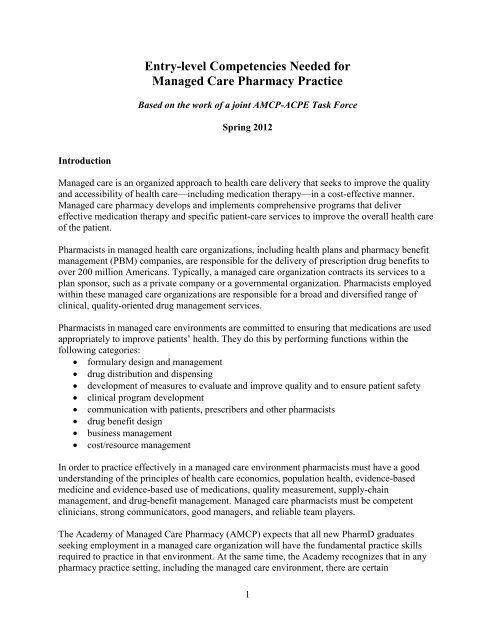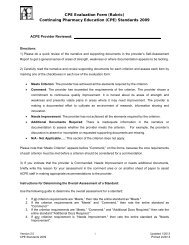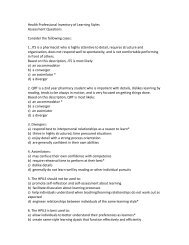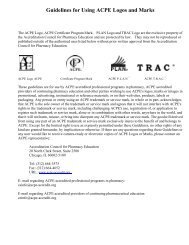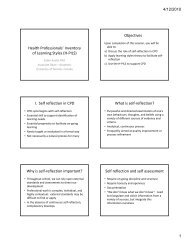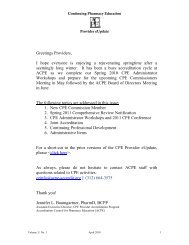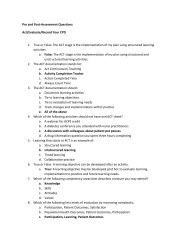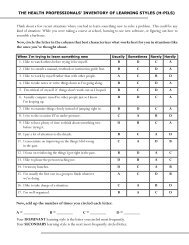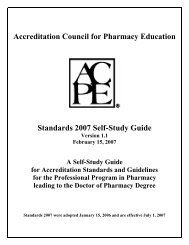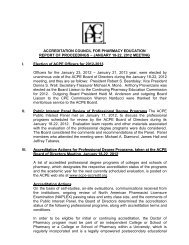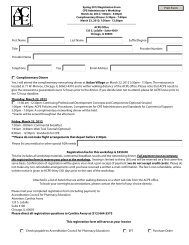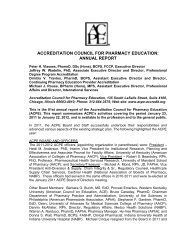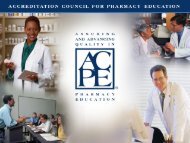Entry-level Competencies Needed for Managed Care Pharmacy ...
Entry-level Competencies Needed for Managed Care Pharmacy ...
Entry-level Competencies Needed for Managed Care Pharmacy ...
You also want an ePaper? Increase the reach of your titles
YUMPU automatically turns print PDFs into web optimized ePapers that Google loves.
<strong>Entry</strong>-<strong>level</strong> <strong>Competencies</strong> <strong>Needed</strong> <strong>for</strong><br />
<strong>Managed</strong> <strong>Care</strong> <strong>Pharmacy</strong> Practice<br />
Based on the work of a joint AMCP-ACPE Task Force<br />
Spring 2012<br />
Introduction<br />
<strong>Managed</strong> care is an organized approach to health care delivery that seeks to improve the quality<br />
and accessibility of health care—including medication therapy—in a cost-effective manner.<br />
<strong>Managed</strong> care pharmacy develops and implements comprehensive programs that deliver<br />
effective medication therapy and specific patient-care services to improve the overall health care<br />
of the patient.<br />
Pharmacists in managed health care organizations, including health plans and pharmacy benefit<br />
management (PBM) companies, are responsible <strong>for</strong> the delivery of prescription drug benefits to<br />
over 200 million Americans. Typically, a managed care organization contracts its services to a<br />
plan sponsor, such as a private company or a governmental organization. Pharmacists employed<br />
within these managed care organizations are responsible <strong>for</strong> a broad and diversified range of<br />
clinical, quality-oriented drug management services.<br />
Pharmacists in managed care environments are committed to ensuring that medications are used<br />
appropriately to improve patients’ health. They do this by per<strong>for</strong>ming functions within the<br />
following categories:<br />
<strong>for</strong>mulary design and management<br />
drug distribution and dispensing<br />
development of measures to evaluate and improve quality and to ensure patient safety<br />
clinical program development<br />
communication with patients, prescribers and other pharmacists<br />
drug benefit design<br />
business management<br />
cost/resource management<br />
In order to practice effectively in a managed care environment pharmacists must have a good<br />
understanding of the principles of health care economics, population health, evidence-based<br />
medicine and evidence-based use of medications, quality measurement, supply-chain<br />
management, and drug-benefit management. <strong>Managed</strong> care pharmacists must be competent<br />
clinicians, strong communicators, good managers, and reliable team players.<br />
The Academy of <strong>Managed</strong> <strong>Care</strong> <strong>Pharmacy</strong> (AMCP) expects that all new PharmD graduates<br />
seeking employment in a managed care organization will have the fundamental practice skills<br />
required to practice in that environment. At the same time, the Academy recognizes that in any<br />
pharmacy practice setting, including the managed care environment, there are certain<br />
1
esponsibilities the employer has <strong>for</strong> the orientation, mentoring and development of a new<br />
pharmacist employee. AMCP views the education and training of managed care pharmacists to<br />
be a shared responsibility between educators and practitioners. We set <strong>for</strong>th in this document a<br />
list of those competencies that we feel might reasonably be expected of all new graduates. We<br />
believe that pharmacists entering managed care pharmacy practice with a good foundation in<br />
these areas will be able to succeed if appropriately coached and mentored by more experienced<br />
practitioners.<br />
There is also a growing need in managed care pharmacy <strong>for</strong> a certain number of advanced-<strong>level</strong><br />
practitioners. In order to help in meeting this need, a number of managed care pharmacy<br />
organizations provide accredited residency training programs.<br />
(Part of the in<strong>for</strong>mation provided above is excerpted directly from one or more of the following<br />
AMCP sites:<br />
www.amcp.org/WorkArea/DownloadAsset.aspx?id=9040<br />
www.amcp.org/WorkArea/DownloadAsset.aspx?id=14955<br />
www.amcp.org/WorkArea/DownloadAsset.aspx?id=14956<br />
The reader is referred to these sites <strong>for</strong> more complete in<strong>for</strong>mation about managed care<br />
organizations and the roles and responsibilities of managed care pharmacists.)<br />
Process<br />
Following an initial planning meeting (conference call), individual members of the Task Force<br />
generated lists of the competencies they felt were necessary <strong>for</strong> entry-<strong>level</strong> pharmacists<br />
practicing in a managed care environment (i.e., competencies that all PharmD graduates should<br />
possess). These initial lists were collected by staff and organized into the following categories:<br />
areas of knowledge required (the cognitive domain), skills required (the psychomotor domain),<br />
and attitudes and values required (the affective domain). The resulting list was sent as a<br />
questionnaire to all task <strong>for</strong>ce members, with instructions to mark each proposed competency<br />
statement as too specific, too broad, or OK as stated. Respondents were also asked to indicate<br />
(with a yes or no reply) if the item was appropriate <strong>for</strong> a new PharmD graduate. A space <strong>for</strong><br />
comments was provided <strong>for</strong> each competency.<br />
The initial list was refined based on feedback received from Task Force members, and the<br />
revised list was sent to Task Force members. A second conference call was scheduled <strong>for</strong><br />
discussion of the results. This discussion led to the development of an amended competency list,<br />
totaling 55 items that served as the basis <strong>for</strong> a survey of the total AMCP membership (using<br />
Survey Monkey®). Respondents were asked to rate each of the 55 competency statements in two<br />
ways: first, they were asked to indicate (with a yes or no vote) if they expected new PharmD<br />
graduates to possess the competency upon graduation; and second, they were asked to rate the<br />
<strong>level</strong> of importance of each competency item in the practice of managed care pharmacy (using a<br />
1 to 5 scale, where 5 represents the highest <strong>level</strong>). The AMCP survey instrument and results are<br />
shown in Appendix 1, beginning on page 8.<br />
2
Following completion of the AMCP membership survey, a third Task Force conference call was<br />
held to discuss the results (including individual comments received from respondents). In<br />
preparation <strong>for</strong> that call staff prepared a summary report that reported the average number of yes<br />
votes <strong>for</strong> each item (indicating respondents’ expectations that new PharmD graduates would<br />
possess that competency) and the average importance rating <strong>for</strong> each. That report is provided in<br />
Appendix 2 (beginning on page 43). Based on this discussion, all the competency statements<br />
were sorted into three categories: (1) those items that received at least 85% yes votes in response<br />
to the question about expectations of new graduates plus an importance rating of 4.0 or greater<br />
(on a scale of 1 to 5); (2) those items that met one of these two thresholds but not both (i.e., 85%<br />
or greater on expectations and less than 4.0 on importance, or less than 85% on expectations but<br />
4.0 or greater on importance); and (3) those items that met neither threshold. It was agreed that a<br />
final survey of Task Force members would be conducted, to allow members to indicate, <strong>for</strong> each<br />
competency statement, whether it should be retained or rejected (based on the results of the<br />
ratings just described). It was understood that the results of this survey would generate a final list<br />
of competencies expected of new PharmD graduates in a managed care practice setting, to be<br />
included in the Task Force’s final report. Staff prepared a survey questionnaire <strong>for</strong> this purpose,<br />
which is shown in Appendix 3 (beginning on page 47). Responses were received from seven<br />
Task Force members. For most of the items that were retained, there was unanimous approval. In<br />
certain other cases, items were retained without a unanimous vote. There was a split vote in each<br />
case where items were ultimately rejected. In such cases, the majority vote (i.e., 4 out of 7) was<br />
used in generating the final list.<br />
Results<br />
Based on the processes described here and data provided in the appendices, the AMCP-ACPE<br />
Task Force concludes that new Doctor of <strong>Pharmacy</strong> graduates seeking employment in a managed<br />
care environment should possess each of the competencies listed below. These are organized into<br />
three domains: the cognitive (knowledge-based) domain, the psychomotor (skills-based)<br />
domain, and the affective (attitudes/values) domain. From the original list of 55 proposed<br />
competency statements, this list includes 44 items. The remaining items (those not included here)<br />
were either combined with other statements in this final list or were rejected based on the results<br />
of the membership survey and subsequent analysis by members of the Task Force.<br />
Cognitive domain<br />
1. Explain the general concept of managed care.<br />
2. Describe the differences between health care delivery models, including PPOs, ACPs,<br />
integrated systems, and patient-centered medical homes.<br />
3. Define pharmacoeconomics and explain practical applications.<br />
4. Outline the general provisions of Medicare Parts A, B, C and D, and Medicaid, including<br />
coverage of medications.<br />
5. Define <strong>for</strong>mulary system and explain the rationale <strong>for</strong> and practical applications of a<br />
<strong>for</strong>mulary system.<br />
6. Describe the steps involved in developing a <strong>for</strong>mulary system.<br />
3
7. Discuss the concept of utilization management and provide functional definitions of key<br />
elements associated with drug-related utilization management (such as prior<br />
authorization, step therapy, and quantity limits).<br />
8. Discuss general concepts associated with the benefit structure of a health plan, including<br />
co-pay vs. co-insurance, premium vs. deductible and maximum out-of-pocket costs.<br />
9. Identify the major factors influencing drug costs <strong>for</strong> a managed care organization (e.g.,<br />
pharmacy costs, drug pricing methodologies, contracts/rebates, discounts).<br />
10. Identify and explain the steps involved in the drug-approval process in the U.S.<br />
11. Explain the purpose and function of pharmacy benefit management programs.<br />
12. Discuss the principles of patient-centered care management programs.<br />
13. Discuss the principles of quality management<br />
14. Explain the role of quality organizations in ensuring quality in the managed care setting.<br />
15. Identify and explain the major roles of the pharmacist in population-based provision of<br />
care (as distinguished from direct patient care).<br />
16. Explain the term specialty pharmaceuticals, give examples of such products, and<br />
describe generally how they are procured, stored and dispensed to patients.<br />
17. Identify several major factors that contribute to drug-related fraud and abuse.<br />
18. Identify several major factors that contribute to drug waste.<br />
19. Discuss the requirements <strong>for</strong> patient confidentiality as provided <strong>for</strong> under the 1996 Health<br />
Insurance Portability and Accountability Act (HIPAA) and professional practice<br />
guidelines.<br />
Psychomotor domain<br />
20. Demonstrate strong clinical skills.<br />
21. Communicate effectively, both orally in writing, in a manner appropriate <strong>for</strong> the intended<br />
audience (e.g., patient, health care provider, plan sponsor).<br />
22. Apply critical-thinking and problem-solving skills.<br />
23. Demonstrate strong computer skills and apply those skills in analyses, presentations and<br />
communications.<br />
24. Function as a productive team member.<br />
25. Advocate on behalf of the appropriate use of medications and needs of patients.<br />
26. Develop a variety of drug-related reports, monographs, reviews, and policies, using drug<br />
literature evaluation skills.<br />
27. Develop educational materials and correspondences <strong>for</strong> patients and caregivers (at the<br />
appropriate <strong>level</strong> of understanding).<br />
28. Conduct literature searches on existing marketed drug products and those in the pipeline.<br />
29. Evaluate appropriateness of clinical trials of medications, including validation of trial<br />
design and assessment of data credibility.<br />
30. Create and maintain effective relationships with others, based on an understanding of the<br />
needs of key stakeholders.<br />
31. Demonstrate effective medication therapy management skills.<br />
32. Apply major clinical practice guidelines in making therapeutic recommendations <strong>for</strong><br />
individual patients.<br />
33. Demonstrate expertise in <strong>for</strong>mulating, interpreting, and evaluating clinical medication<br />
criteria.<br />
4
34. Conduct medication utilization evaluations.<br />
35. Identify quality/outcome indicators that could be used in evaluating a specific pharmacy<br />
service or program.<br />
36. Evaluate medication-use patterns in a specified patient population.<br />
Affective domain<br />
37. Respect <strong>for</strong> employer, colleagues and patients<br />
38. Honesty and integrity<br />
39. Appropriate work ethic<br />
40. Personal responsibility and accountability<br />
41. Professional dress<br />
42. Respect <strong>for</strong> patient confidentiality and privacy<br />
43. Honoring promises (keeping commitments)<br />
44. Punctuality<br />
We believe the findings of this Task Force have important implications both <strong>for</strong> the American<br />
Association of Colleges of <strong>Pharmacy</strong> (AACP) and the Accreditation Council <strong>for</strong> <strong>Pharmacy</strong><br />
Education (ACPE), and AMCP stands ready to work with both organizations to ensure that<br />
pharmacy students receive the necessary education and training to practice upon graduation at an<br />
entry <strong>level</strong> in the managed care environment. AMCP remains dedicated to providing education<br />
and training opportunities in the areas of postgraduate residency training and continuing<br />
professional development, to ensure a continuing supply of qualified manpower in managed care<br />
pharmacy. We seek to work closely with the academic community in discharging our<br />
responsibilities in these areas, as well as in continually assessing the entry-<strong>level</strong> competencies<br />
required of new graduates.<br />
5
List of Task Force Members:<br />
AMCP Staff:<br />
Amanda Bain, PharmD, MPH<br />
Assistant Director, <strong>Pharmacy</strong> Benefit Services<br />
The Ohio State University Health Plan, Inc.<br />
Columbus, Ohio<br />
Shawn Burke, BSPharm, RPh<br />
Regional Vice President, <strong>Pharmacy</strong> Services<br />
Coventry Health <strong>Care</strong><br />
Kansas City, Missouri<br />
<strong>Care</strong>y C. Cotterell, BSPharm, RPh, FAMCP, FCSHP<br />
<strong>Managed</strong> Health <strong>Care</strong> <strong>Pharmacy</strong> Consultant<br />
Diamond Bar, Cali<strong>for</strong>nia<br />
James T. Kenney, BSPharm, RPh, MBA<br />
<strong>Pharmacy</strong> Operations Manager<br />
Harvard Pilgrim Health <strong>Care</strong><br />
Wellesley, Massachusetts<br />
Daniel McConnell, PharmD<br />
Clinical Coordinator, Department of <strong>Pharmacy</strong><br />
Geisinger Health Plan<br />
Danville, Pennsylvania<br />
Ann Nakahira, PharmD<br />
Residency Program Coordinator<br />
Clinical Pharmacist, OptumRx<br />
Irvine, Cali<strong>for</strong>nia<br />
Lynn Nishida, BSPharm, RPh<br />
Vice President, Clinical Services<br />
Catalyst Rx Center of Excellence, Northwest Region<br />
Portland, Oregon<br />
Shirley Reitz, PharmD<br />
Director, <strong>Pharmacy</strong> Clinical Services<br />
Group Health Cooperative<br />
Seattle, Washington<br />
Marissa Schlaifer, MS, RPh<br />
Director of <strong>Pharmacy</strong> Affairs<br />
6
ACPE Staff:<br />
Peter H. Vlasses, PharmD, DSc (Hon.), BSCP<br />
Executive Director<br />
Stephanie Gardner, PharmD<br />
Board Liaison<br />
Max D. Ray, PharmD, MS, LHD (Hon.)<br />
Consultant<br />
7
APPENDIX 1<br />
AMCP membership survey instrument and results<br />
The following questionnaire was sent to the entire membership of AMCP. (Note: AMCP has<br />
associate and student membership categories, in addition to regular membership. Instructions<br />
accompanying the questionnaire made it clear that it was intended <strong>for</strong> pharmacist members.<br />
Since the questionnaire was mailed to all members, it is possible that some responses were<br />
received from non-pharmacists. We think it is likely, however, that very few, if any, nonpharmacists<br />
actually responded, and we are com<strong>for</strong>table that the results we obtained reflect a<br />
good cross-section of AMCP’s members.)<br />
For each item, respondents were asked to respond to two questions: (1) Should all new PharmD<br />
graduates possess the specific competency (yes or no)?, and (2) how important is the competency<br />
to your practice site (rated on a 5-point Likert scale, from not important to very important)?<br />
Respondents had an opportunity to provide open-ended comments under each domain heading<br />
(i.e., knowledge, skills, and attitudes/values/behaviors) about additional competencies they felt<br />
new PharmD graduates should possess under each of those headings.<br />
Results of the survey are shown below.<br />
8
Explanatory comments:<br />
1. Items 1 through 23 correspond to the cognitive domain (areas of knowledge expected of<br />
new PharmD graduates).<br />
2. Items 26 through 49 correspond to the psychomotor domain (skills expected of new<br />
graduates).<br />
3. Items 52 through 59 correspond to the affective domain (attitudes, values, behaviors)<br />
expected of new graduates. (Note that items 47 and 48 in the questionnaire are duplicate<br />
items).<br />
4. Items 24, 50 and 61 provide rankings of the <strong>level</strong> of importance of each competency in<br />
the three domains. For example, the table shown in item 24 provides the ratings <strong>for</strong> each<br />
of the competencies in the cognitive domain (items 1 through 23); the table in item 50<br />
corresponds to competencies in the psychomotor domain (items 26 through 49); and the<br />
table in item 61 corresponds to competencies in the affective domain (items 52 through<br />
59).<br />
5. All comments received from respondents regarding additional desired competencies are<br />
shown in pp. 27 through 37 of the report. Those comments on pp. 27 through 31 relate to<br />
areas of knowledge that new PharmD graduates should possess (the cognitive domain);<br />
comments on pp. 33-34 relate to skills (the psychomotor domain); and comments on pp.<br />
36-37 relate to attitudes/values/behaviors (the affective domain). (Please note that some<br />
numbered pages in the report are blank; this is a <strong>for</strong>matting issue—no in<strong>for</strong>mation is<br />
missing).<br />
42
APPENDIX 2<br />
Correlation of AMCP membership survey results <strong>for</strong> individual<br />
competency items: <strong>level</strong> of expectation of new graduates vs. <strong>level</strong> of<br />
importance<br />
This table compares respondents’ <strong>level</strong> of agreement that each competency item should be<br />
expected of all new PharmD graduates with the average <strong>level</strong> of importance attributed to that<br />
item.<br />
Item No.<br />
(from<br />
questionnaire)<br />
Proposed competency item<br />
Expected of<br />
new grads<br />
(% yes votes)<br />
Level of<br />
importance<br />
(1 to 5)<br />
Knowledge (cognitive domain)<br />
1 Explain the general concept of managed care 95.2 4.67<br />
2 Describe the differences between health care<br />
delivery models (PPOs, ACPs, integrated<br />
systems, patient-centered medical homes<br />
61.4 3.68<br />
3 Describe the macro- and micro-economics<br />
associated with health care and how health care<br />
is financed<br />
4 Outline the general provisions of Medicare<br />
Parts A, B, C and D, and Medicaid, including<br />
coverage of medications<br />
5 Define <strong>for</strong>mulary system and explain the<br />
rationale <strong>for</strong> and practical applications of a<br />
<strong>for</strong>mulary system<br />
6 Describe the steps involved in developing a<br />
<strong>for</strong>mulary system<br />
7 Discuss the concept of utilization management<br />
and provide functional definitions of key<br />
elements associated with drug-related utilization<br />
management programs (such as prior<br />
authorization, step therapy, and quantity limits)<br />
8 Discuss general concepts associated with the<br />
benefit structure of a health plan, including copay<br />
vs. co-insurance, premium vs. deductible,<br />
and maximum out-of-pocket costs<br />
9 Identify the major factors influencing drug costs<br />
<strong>for</strong> a managed care organization (e.g., pharmacy<br />
costs, drug pricing methodologies,<br />
contracts/rebates, discounts)<br />
10 Describe in a general way the factors involved<br />
in processing eligibility and claims <strong>for</strong><br />
48.4 3.39<br />
71.6 3.93<br />
96.0 4.48<br />
72.6 4.05<br />
89.1 4.45<br />
82.3 4.23<br />
55.1 3.98<br />
53.2 3.66<br />
43
prescription drugs and related services in a<br />
managed care organization<br />
11 Explain the role of quality organizations and 53.0 3.72<br />
accreditation agencies in ensuring quality of<br />
managed care operations (including the quality<br />
of patient care and the quality of pharmaceutical<br />
products and devices purchased by the<br />
organization)<br />
12 Identify and describe the steps involved in the 75.5 3.71<br />
drug distribution process, from the<br />
manufacturer to the ultimate consumer<br />
(including physicians, nurses, pharmacists and<br />
patients) and the prescription reimbursement<br />
flow from managed care provider to pharmacy<br />
and the patient<br />
13 Explain how state and federal laws and<br />
56.7 3.82<br />
regulations are integrated into the operation of a<br />
managed care organization<br />
14 Identify and explain the steps involved in the 90.6 3.70<br />
drug-approval process in the U.S.<br />
15 Explain the general structure and functions of 52.6 3.52<br />
alternative health-care delivery options,<br />
including integrated health systems, accountable<br />
care organizations, and patient-centered medical<br />
homes<br />
16 Explain the purpose and function of pharmacy 87.0 4.30<br />
benefit management programs<br />
17 Discuss the principles of disease management 88.7 4.18<br />
programs/care management programs<br />
18 Discuss the principles of quality management 72.5 3.96<br />
19 Identify and explain the major roles of the<br />
75.5 4.00<br />
pharmacist in population-based provision of<br />
care (as distinguished from direct patient care)<br />
20 Explain the term specialty pharmaceuticals, 88.6 4.14<br />
give examples of such products, and describe<br />
generally how they are procured, stored and<br />
dispensed to patients<br />
21 Identify several major factors that contribute to 82.5 3.89<br />
drug-related fraud and abuse<br />
22 Identify several major factors that contribute to 84.5 3.89<br />
drug waste<br />
23 Discuss the requirements <strong>for</strong> patient<br />
confidentiality as provided <strong>for</strong> under HIPAA<br />
and professional practice standards<br />
94.7 4.52<br />
Skills (psychomotor domain)<br />
44
26 Demonstrate strong clinical skills 94.9 4.64<br />
27 Communicate effectively, both orally in writing 99.0 4.86<br />
28 Demonstrate appropriate business and<br />
67.9 4.13<br />
management skills<br />
29 Apply critical-thinking and problem-solving 97.0 4.71<br />
skills<br />
30 Demonstrate strong computer skills and apply 94.9 4.47<br />
those skills in analyses, presentations and<br />
communications<br />
31 Apply project-management skills 60.4 3.97<br />
32 Function as a productive team member 99.0 4.72<br />
33 Advocate on behalf of the appropriate use of 96.4 4.43<br />
medications and needs of patients<br />
34 Demonstrate a respect <strong>for</strong> patient confidentiality 99.0 4.69<br />
and privacy rights<br />
35 Develop a variety of drug-related reports,<br />
84.3 4.17<br />
monographs, reviews, and policies, using drug<br />
literature evaluation skills<br />
36 Develop educational materials and<br />
81.0 3.96<br />
correspondences <strong>for</strong> patients and caregivers (at<br />
the appropriate <strong>level</strong> of understanding)<br />
37 Conduct literature search on existing marketed 96.4 4.33<br />
drug products and those in the pipeline<br />
38 Evaluate appropriateness of clinical trials of 85.6 4.21<br />
medications, including validation of trial design<br />
and assessment of data credibility<br />
39 Create and maintain effective relationships with 93.4 4.47<br />
others, based on an understanding of the needs<br />
of key stakeholders<br />
40 Demonstrate effective medication therapy<br />
86.7 4.15<br />
management skills<br />
41 Apply major clinical practice guidelines in 94.4 4.47<br />
making treatment recommendations<br />
42 Demonstrate expertise in translating/interpreting 86.3 4.36<br />
clinical medication criteria<br />
43 Per<strong>for</strong>m medication reconciliation <strong>for</strong> any<br />
75.6 3.86<br />
patient transitioning from one care setting to<br />
another<br />
44 Conduct medication utilization reviews 89.3 4.20<br />
45 Make therapeutic recommendations <strong>for</strong><br />
86.8 4.02<br />
individual patients<br />
46 Identify drug-related outcomes that could be<br />
used in evaluating a specific pharmacy service<br />
or program, such as medication-adherence<br />
education, selection of interventions in an MTM<br />
program, etc.<br />
82.4 4.25<br />
45
47 Evaluate the merits of a specific drug-related<br />
policy<br />
48 (Duplicate of #47)<br />
49 Evaluate medication-use patterns in a specified<br />
patient population<br />
77.6 3.98<br />
82.7 4.17<br />
Attitudes, values, behaviors (affective domain)<br />
52 Respect <strong>for</strong> employer, colleagues and patients 100 4.93<br />
53 Honesty and integrity 100 4.95<br />
54 Appropriate work ethic 100 4.89<br />
55 Personal responsibility and accountability 100 4.92<br />
56 Professional dress 99.5 4.45<br />
57 Respect <strong>for</strong> patient confidentiality and privacy 100 4.90<br />
58 Honoring promises 98.4 4.84<br />
59 Punctuality 98.4 4.68<br />
46
APPENDIX 3<br />
Task Force Questionnaire: Retention of competency items <strong>for</strong><br />
new PharmD graduates<br />
This table provides the questionnaire that was sent to members of the Task Force to<br />
indicate which competency items should be retained and rejected. The number of<br />
affirmative votes (out of a total of 7) is shown in the right column. Comments were<br />
provided by members of the Task Force to justify a vote to reject an item. These are<br />
summarized below.<br />
Item<br />
number<br />
(from<br />
questionnaire)<br />
Competency item %<br />
yes<br />
votes<br />
47<br />
Importanc<br />
e <strong>level</strong><br />
Retain<br />
this item?<br />
(yes or<br />
no)<br />
Items meeting both thresholds (“yes” votes 85% or greater, importance rating 4.0 or higher:<br />
1 Explain the general concept of managed care 95.2 4.67 7<br />
5 Define <strong>for</strong>mulary system and explain the rationale <strong>for</strong> 96.0 4.48 7<br />
and practical applications of a <strong>for</strong>mulary system<br />
7 Discuss the concept of utilization management and<br />
provide functional definitions of key elements<br />
associated with drug-related utilization management<br />
(such as prior authorization, step therapy, and<br />
quantity limits)<br />
89.1 4.45 7<br />
16 Explain the purpose and function of pharmacy benefit<br />
management programs<br />
*17 Discuss the principles of disease management<br />
programs/care management programs<br />
20 Explain the term specialty pharmaceuticals, give<br />
examples of such products, and describe generally<br />
how they are procured, stored and dispensed to<br />
patients<br />
23 Discuss the requirements <strong>for</strong> patient confidentiality as<br />
provided <strong>for</strong> under HIPAA and professional practice<br />
standards<br />
87.0 4.30 7<br />
88.7 4.18 7<br />
88.6 4.14 7<br />
94.7 4.52 7<br />
26 Demonstrate strong clinical skills 94.9 4.64 7<br />
27 Communicate effectively, both orally and in writing 99.0 4.64 7<br />
29 Apply critical-thinking and problem-solving skills 97.0 4.71 7<br />
30 Demonstrate strong computer skills and apply those 94.9 4.47 7<br />
skills in analyses, presentations and communications<br />
32 Function as a productive team member 99.0 4.72 7<br />
33 Advocate on behalf of the appropriate use of<br />
96.4 4.45 7<br />
medications and needs of patients<br />
34 Demonstrate a respect <strong>for</strong> patient confidentiality and 99.0 4.69 Combined<br />
privacy rights<br />
with #57
37 Conduct literature search on existing marketed drug 96.4 4.33 7<br />
products and those in the pipeline<br />
38 Evaluate appropriateness of clinical trials of<br />
85.6 4.21 7<br />
medications, including validation of trial design and<br />
assessment of data credibility<br />
39 Create and maintain effective relationships with 93.4 4.47 7<br />
others, based on an understanding of the needs of key<br />
stakeholders<br />
40 Demonstrate effective medication therapy<br />
86.7 4.15 7<br />
management skills<br />
*41 Apply major clinical practice guidelines in making 94.4 4.47 7<br />
treatment recommendations<br />
*42 Demonstrate expertise in translating/interpreting 86.3 4.36 7<br />
clinical medication criteria<br />
*44 Conduct medication utilization reviews 89.3 4.20 7<br />
45 Make therapeutic recommendations <strong>for</strong> individual 86.8 4.02 Combined<br />
patients<br />
with #41<br />
52 Respect <strong>for</strong> employer, colleagues and patients 100 4.93 7<br />
53 Honesty and integrity 100 4.95 7<br />
54 Appropriate work ethic 100 4.92 7<br />
55 Personal responsibility and accountability 100 4.92 7<br />
56 Professional dress 99.5 4.45 7<br />
57 Respect <strong>for</strong> patient confidentiality and privacy 100 4.90 7<br />
58 Honoring promises 98.4 4.84 7<br />
59 Punctuality 98.4 4.68 7<br />
Items meeting one of the thresholds, but not both:<br />
6 Describe the steps involved in developing a <strong>for</strong>mulary 72.6 4.05 5<br />
system<br />
8 Discuss general concepts associated with the benefit 82.3 4.23 7<br />
structure of a health plan, including co-pay vs. coinsurance,<br />
premium vs. deductible, and maximum outof-pocket<br />
costs<br />
14 Identify and explain the steps involved in the drugapproval<br />
90.6 3.70 5<br />
process in the U.S.<br />
19 Identify and explain the major roles of the pharmacist 75.5 4.00 5<br />
in population-based provision of care (as distinguished<br />
from direct patient care)<br />
**28 Demonstrate appropriate business and management 67.9 4.13 2<br />
skills<br />
35 Develop a variety of drug-related reports,<br />
84.3 4.17 6<br />
monographs, reviews, and policies, using drug<br />
literature evaluation skills<br />
*46 Identify drug-related outcomes that could be used in<br />
evaluating a specific pharmacy service or program,<br />
such as medication-adherence education, selection of<br />
interventions in an MTM program, etc.<br />
82.4 4.25 6<br />
48
49 Evaluate medication-use patterns in a specified patient<br />
population<br />
Items meeting neither threshold:<br />
2 Understand the differences between health care<br />
delivery models (PPOs, ACPs, integrated systems,<br />
patient-centered medical homes)<br />
*3 Describe the macro- and micro-economics associated<br />
with health care and how health care is financed<br />
4 Outline the general provisions of Medicare Parts A, B,<br />
C and D, and Medicaid, including coverage of<br />
medications<br />
9 Identify the major factors influencing drug costs <strong>for</strong> a<br />
managed care organization (e.g., pharmacy costs, drug<br />
pricing methodologies, contracts/rebates, discounts)<br />
**10 Describe in a general way the factors involved in<br />
processing eligibility and claims <strong>for</strong> prescription drugs<br />
and related services in a managed care organization<br />
11 Explain the role of quality organizations and<br />
accreditation agencies in ensuring quality of managed<br />
care operations (including the quality of patient care<br />
and the quality of pharmaceutical products and<br />
devices purchased by the organization)<br />
12 Identify and describe the steps involved in the drug<br />
distribution process, <strong>for</strong>m the manufacturer to the<br />
ultimate consumer (including physicians, nurses,<br />
pharmacists and patients) and the prescription<br />
reimbursement flow from managed care provider to<br />
pharmacy and the patient<br />
13 Explain how state and federal laws and regulations are<br />
integrated into the operation of a managed care<br />
organization<br />
**15 Explain the general structure and functions of<br />
alternative health-care delivery options, including<br />
integrated health systems, accountable care<br />
organizations, and patient-centered medical homes<br />
82.7 4.17 5<br />
61.4 3.68 4<br />
48.4 3.39 3<br />
Rejected,<br />
replaced<br />
with alt.<br />
wording<br />
71.6 3.93 7<br />
55.1 3/98 5<br />
53.2 3.66 3<br />
53.0 3.72 5<br />
Combined<br />
with #18<br />
below<br />
75.5 3.71 4<br />
56.7 3.82 4<br />
52.6 3.52 3<br />
*18 Discuss the principles of quality management 72.5 3.96 4<br />
21 Identify several major factors that contribute to drugrelated<br />
82.5 3.89 6<br />
fraud and abuse<br />
22 Identify several major factors that contribute to drug 84.5 3.89 5<br />
waste<br />
**31 Apply project-management skills 60.4 3.97 3<br />
36 Develop educational materials and correspondences<br />
<strong>for</strong> patients and caregivers (at the appropriate <strong>level</strong> of<br />
81.0 3.96 6<br />
49
understanding)<br />
**43 Per<strong>for</strong>m medication reconciliation <strong>for</strong> any patient 75.6 3.86 3<br />
transitioning from one care setting to another<br />
**47 Evaluate the merits of a specific drug-related policy 77.6 3.98 2<br />
*indicates items that will be amended in the final report based on comments received<br />
from Task Force members.<br />
**indicates items that will be rejected based on comments from Task Force members<br />
Summary of comments received to justify rejecting an item:<br />
Item 10-- Describe in a general way the factors involved in processing eligibility and claims <strong>for</strong><br />
prescription drugs and related services in a managed care organization.<br />
Much too specific to managed care—unreasonable to expect all PharmD graduates to be<br />
able to do this.<br />
Item 15-- Explain the general structure and functions of alternative health-care delivery options,<br />
including integrated health systems, accountable care organizations, and patient-centered<br />
medical homes<br />
This is adequately covered by item 2 and can be eliminated.<br />
Item 28-- Demonstrate appropriate business and management skills.<br />
Much too broad; it would be difficult <strong>for</strong> educators to know what is “appropriate” <strong>for</strong> a<br />
managed care pharmacy setting.<br />
Item 31-- Apply project-management skills.<br />
Much too broad.<br />
Item 43-- Per<strong>for</strong>m medication reconciliation <strong>for</strong> any patient transitioning from one care setting<br />
to another.<br />
This is adequately covered under item 40. Many managed care pharmacists do not work<br />
in integrated systems and would not have a great need to do this.<br />
Item 47--Evaluate the merits of a specific drug-related policy.<br />
Much too vague; doesn’t give much guidance to educators.<br />
50
For more in<strong>for</strong>mation, please contact:<br />
Marissa Schlaifer, MS, RPh<br />
Director of <strong>Pharmacy</strong> Affairs<br />
Academy of <strong>Managed</strong> <strong>Care</strong> <strong>Pharmacy</strong><br />
100 N. Pitt St., Suite 400<br />
Alexandria, VA 22314<br />
(703) 683-8416<br />
e-mail: mschlaifer@amcp.org<br />
or<br />
Peter H. Vlasses, PharmD, DSc (Hon), BCPS, FCCP<br />
Executive Director<br />
Accreditation Council <strong>for</strong> <strong>Pharmacy</strong> Education (ACPE)<br />
135 S. LaSalle Street, Suite 4100<br />
Chicago, IL 60603-4810<br />
(312) 664-3575<br />
e-mail: pvlasses@acpe-accredit.org<br />
51


